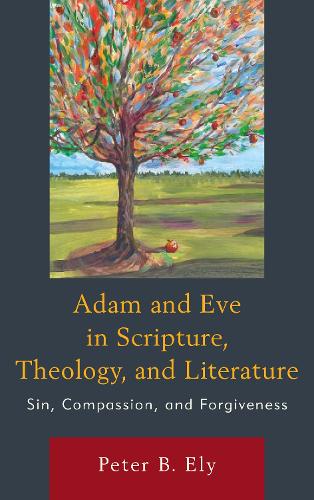
Adam and Eve in Scripture, Theology, and Literature: Sin, Compassion, and Forgiveness
(Hardback)
Available Formats
Publishing Details
Adam and Eve in Scripture, Theology, and Literature: Sin, Compassion, and Forgiveness
By (Author) Peter B. Ely
Bloomsbury Publishing PLC
Lexington Books
15th January 2018
United States
Classifications
Professional and Scholarly
Non Fiction
Criticism and exegesis of sacred texts
Old Testaments
222.1106
Physical Properties
Hardback
350
Width 158mm, Height 238mm, Spine 31mm
689g
Description
Adam and Eve in Scripture, Theology, and Literature: Sin, Compassion, and Forgiveness is an extended consideration of the narrative of Adam and Eve, first seen in the Hebrew Bible but given new life by St. Paul in the New Testament. Pauls treatment of Adam and Eve, especially his designation of Christ as a second Adam, has had an enormous influence in Christianity. Peter Ely follows this rich narrative as it develops in history, providing the basis of the doctrine of original sin in Christianity, giving rise in modern times to theological speculation, and entering thematically into mysticism and literature. The power of the adamic narrative can only be realized if one treats it as a true but non-historical myth. The truth of the myth lies in its ability to stimulate thinking and so reveal the depths of human experience. Augustine understood that, so did Julian of Norwich, and even the Belgian author of mystery stories, Georges Simenon, who had a deep sense of the universality of human weakness and the possibilities of redeeming what was lost. Simenons detective Maigret saw himself as a mender of destinies. The doctrine of original sin, the notion that human beings share a common vulnerability, can open the way to compassion and forgiveness. As Shakespeare illustrates in Measure for Measure, the awareness of weakness in ourselves should move us to compassion for others. The recognition of a kind of democracy of sin can keep us from considering ourselves better than others, unlike them in their weakness, and entitled to stand in judgment of them. Thus, compassion opens the door to forgiveness. The progress from sin to compassion to forgiveness forms the heart of this work.
Reviews
Ely takes an unusual route in discussing the story of Adam and Eve and the concepts that have impacted history, theory, and literature for centuries. His subtitle Sin, Compassion, and Forgiveness really forms the basis of the book, while the narrative of Adam and Eve hovers in the background. Ely focuses on the concepts embedded within their story that have influenced thinkers and have enduring implications for church and society today. His method of analysis encourages readers to look beyond traditional theological and theoretical texts for examples of brokenness, compassion, and forgiveness. * Reading Religion *
What do the myth of Adams Fall and the doctrine of original sin have to do with forgiveness Everything, according to Ely (Seattle Univ.). In this book he explains the myth of Adams Fall in terms of a common human tendency toward moral darkness, confusion, and helplessness. This tendency is the heart of original sin, in the authors view, and it supplies a basis for the compassion required for genuine forgiveness and redemption. The awareness of original sin in oneself can motivate compassion toward others who need forgiveness. This awareness thus can provide a ground for mercy toward people who do not deserve forgiveness, which in turn can prompt one to share in the suffering of others for the sake of reconciliation. Drawing from Augustine, Hugh of St. Victor, Julian of Norwich, Ricoeur, and Girard, among others, Ely covers theological, philosophical, and spiritual themes central to the Christian tradition on forgiveness and redemption. He traces such themes beyond theory and doctrine to literature, such as in the story of Perceval and in Shakespeares Measure for Measure. Summing Up: Recommended. Upper-division undergraduates through faculty. * CHOICE *
Peter Ely has written a masterpiece. Adam and Eve in Scripture, Theology, and Literature: Sin, Compassion, and Forgiveness traces a history of the creation narrative that centers on the compassion of God as the basis for God's grace and forgiveness. Human compassion shows up, too, in literature, philosophy, and theology in a way that reflects God's motive for forgiving. This book will make a strong theological contribution to the forgiveness literature. -- Everett L. Worthington, Virginia Commonwealth University
Through his skillful use of sources both classical and contemporary, spanning genres of philosophy, theology, drama, and literatureeach providing its own lens through which to unfold the dynamic tension between sin and forgivenessEly invites us to meditate deeply on the inner workings of the human heart in a world riven by sin but called by a loving God to redemption. Compassion is the key. As Ely argues, compassion is the bridge between sin and forgiveness. At once scholarly and pastoral, Peter Elys exploration of forgiveness will serve as a rich resource for anyone seeking to understand the human experience of forgiveness more deeply. -- James Voiss, author of Rethinking Christian Forgiveness: Theological, Philosophical, and Psychological Explorations
Author Bio
Peter B. Ely is associate professor of theology and religious studies at Seattle University.
